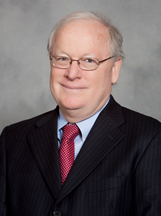Our healthcare system is in the midst of a crisis - struggling to ramp up quickly to respond to patient demand in response to COVID-19. Appropriately so, organizations are focusing on the immediate crisis. However, it would be wise to start thinking about how the healthcare system will function after the pandemic is over. Planning and preparation for healthcare post COVID-19 should be examined to explore the opportunities, challenges, and strategies that we will all face in the future. While no one knows all the answers, this webinar, originally presented April, 29th, 2020, with Dr. Kent Bottles, established health industry speaker, consultant, and thought leader, explores early lessons learned from this medical and economic crisis.
Key Learnings from COVID-19:
Lessons Gleaned to Date to Inspire Healthcare Transformations
Presenter: Kent Bottles, MD
Date: April 29, 2020
Q & A with Dr. Bottles:
- How long will it be before we will know if there is immunity to the virus?
This is a new virus that humans have not encountered before so we don't have any antibodies or T cells that are readily available when we get infected. Because it is a new encounter we don't know much about the response, about whether it indeed does confer immunity, and if it does confer immunity how long that immunity lasts. We will have to wait several months and see if infected patients are protected from future infections. There was a scare in South Korea where several patients who had been infected, tested negative, and then later tested positive indicating reinfection. Now, they think there has not been reinfection, but testing problems. The tests for both infection and immunity are not perfect and seem to have a lot of false positives and false negatives. - Do you think that the trajectory and/or number of cases in the US would be different under a universal healthcare system?
A universal healthcare system would perhaps have helped in a small way with the trajectory and number of cases in the United States if reluctance to go to the ER or get tested was mostly due to uninsured people fearing a large bill. I don't think that was the major problem. Rather we have ignored the warnings of people like Bill Gates and infectious disease experts that we should invest in learning more about possible viruses that can jump from bats to an intermediate host and then to humans. I would invest the billion dollars to identify and study the 1.2 million viruses that we know live in bats. - Given the burden Covid-19 has placed on nurses/staff, should we expect increased use of in-hospital audiovisual monitoring systems that let fewer clinical staff care for more isolated/infectious patients?
Yes, I think that we will see all sorts of attempts to use technology to change the way we take care of patients. - Why have the death rates from Covid-19 been so different in Seattle & San Francisco (relatively low) compared to New York City (very high)?
A recent New Yorker article, Seattle’s Leaders Let Scientists Take the Lead. New York’s Did Not, makes a convincing argument that the west coast cities did two things: they established social distancing earlier and they let the public health officials, and not the politicians, lead the public communication strategy. - Why don't we just let everybody go about their usual business, get infected, and achieve herd immunity more quickly?
This would certainly end the pandemic more quickly, but it would also overtax the hospital system and lead to many more deaths. It is difficult to achieve the perfect balance between ending the pandemic and avoiding death rates that are not acceptable. - Why did the richest country on earth not have enough PPE to protect nurses and doctors?
We have created supply chains that are very efficient and work well when not stressed. The hospital administrators' push to squeeze all the waste out of the system has led to a system that cannot respond to such a massive emergency. - Why has the CDC not held briefings? I think I recall they took the lead in SARS epidemic in 2002 and in the H1N1 epidemic.
The Trump administration has decided to let Mike Pence and not the CDC lead the pandemic taskforce. See referenced New Yorker article above. - Why did the SARS epidemic burn itself out with only about 12,000 deaths world-wide while the Covid-19 is killing hundreds of thousands? What is the difference?
Remember that viruses are not really living things, they need a human or animal host to supply the machinery to replicate more viruses. The fact that SARS had a mortality rate of 10% and showed symptoms right away (few asymptomatic infectious hosts) meant that by killing the humans more efficiently the SARS virus also prevented widespread disease.
For more TLD Group resources for navigating the challenging waters created by the COVID-19 pandemic visit the
Crisis Leadership Support Center
 Dr. Kent Bottles, MD
Dr. Kent Bottles, MD
Developing strategies and tactics to successfully engage physicians in quality, leadership, payment reform, and change management has been the focus of Dr. Bottles' work for over 35 years. He has extensive expertise in federal, state, and local healthcare delivery system reform. Dr. Bottles currently teaches health care policy and payment reform to graduate students pursuing their Master of Science in Health Policy, Applied Health Economics and Outcomes Research, Public Health, and Healthcare Quality and Safety at The Thomas Jefferson School of Population Health in Philadelphia. Dr. Bottles delivers 50 keynotes a year on topics ranging from: Digital Medicine, The Science of Positive Psychology, Social Media, Change Management, Leadership for Chaotic Times, Big Data vs. Tiny Data, The Doctor/Patient Relationship for the 21st Century, and Activation and Engagement of the e-Patient.
Dr. Bottles currently serves as a TLD Group Advisory Board member and has held a number of physician executive positions over the course of his career, including Tenured Professor at the University of Iowa and Michigan State University College of Human Medicine, Assistant Dean for Grand Rapids at MSU, Chief Medical Officer of the Iowa Health Science, President and CEO of the Institute for Clinical Systems Improvement in Minneapolis, President and CEO of the Grand Rapids Medical Education and Research Center in Michigan, Chief Knowledge Officer and President of the Genomics Repository for a bio-tech startup, and Chief Medical Officer for a medical communications startup.



